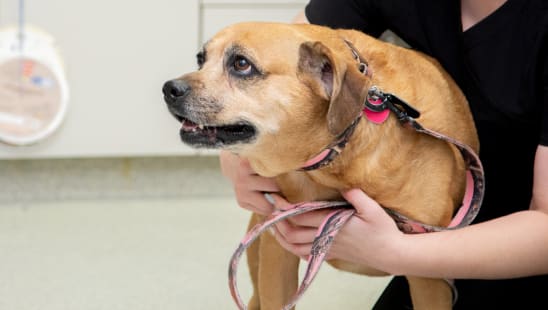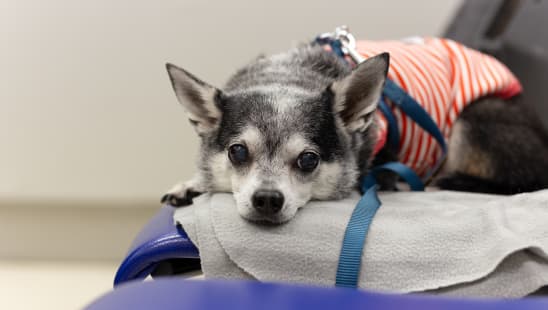Your senior cat or dog may need extra attention as they mature. Our veterinarians at Thomasville Veterinary Hospital Urgent Care + Surgery provide geriatric care to make sure your pet enjoys a healthy, comfortable and long life.
Geriatric Care for Cats & Dogs
Illnesses and disorders can creep up on our pets as they age - just like with humans. That's why prevention and early diagnosis are key.
You can play a role in extending your pet's life and ensure their general wellbeing by bringing them in for semi-annual routine physical exams, even if they seem healthy.
Our veterinarians know what to look for, and may be able to spot health problems early, while they are more easily managed.

When does an animal become old?
While it varies, small dogs and cats are normally considered geriatric at the age of 7.
Larger breed dogs tend to have shorter life spans and are considered geriatric when they reach 6 years of age.
Common Health Problems in Senior Pets
Veterinary care and dietary habits have improved, causing cats and dogs to live longer than ever before.
While this is generally a good thing, pets, their owners, and veterinarians now encounter far more age-related conditions.
Geriatric pets can develop many of the same problems seen in older people, such as:
- Cancer
- Heart, kidney, or liver disease
- Urinary tract disease
- Blindness and hearing loss
- Thyroid disease
- Diabetes
- Joint or bone diseases
- Senility
- Dental diseases
Senior Wellness Diagnostics
As your veterinary team, we diagnose your pet's health problems and develop a plan of action and treatment to keep them happy, healthy, and comfortable into their golden years.
We carefully examine your pet, ask detailed questions about their behavior at home, and run tests that will reveal more insight into their internal systems.
You can choose from three different levels of diagnostics depending on the needs of your dog or cat.
- Gold
The Gold Level includes:
- Abdominal ultrasound
- Thyroid hormone test
- Abdominal radiographs
- Full urinalysis
- Physical examination with intraocular pressures test
- Schirmer Tear test
- Rectal exam
- Fundic exam
- Major bloodwork panel, including chemistries, electrolytes and a complete blood count
- Blood pressure check
- Silver
The Silver Level includes:
- Thyroid hormone test
- Abdominal radiographs
- Full urinalysis
- Physical examination with intraocular pressures test
- Schirmer Tear test
- Rectal exam
- Fundic exam
- Major bloodwork panel, including chemistries, electrolytes and a complete blood count
- Blood pressure check
- Bronze
The Bronze Level includes:
- Physical examination with intraocular pressures test
- Schirmer Tear test
- Rectal exam
- Fundic exam
- Major bloodwork panel, including chemistries, electrolytes and a complete blood count
- Blood pressure check
Based on our findings, we'll recommend activities, medications, and dietary changes to improve your senior pet’s health and wellbeing.
Do not hesitate to ask any questions you have about diagnostics or caring for your senior pet. Feel free to ask during your exam or call us any time.

Signs of Hidden Illness in Senior Pets
If your senior pet is exhibiting any of these signs, it is imperative to seek veterinary care to safely diagnose and treat any specific illnesses that might manifest soon after onset:
- Limping or stiffness after daily exercise
- Abnormal breathing patterns or exercise intolerance
- Abnormal growths
- Changes in urination, thirst, or appetite
- Unusual changes in weight, skin, or hair
